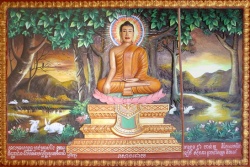Difference between revisions of "Eight Precepts"
| Line 32: | Line 32: | ||
: 8 no eating after noon | : 8 no eating after noon | ||
[[Category:Buddhist Ethics]] | [[Category:Buddhist Ethics]] | ||
| − | {{BuddhismbyNumber}} | + | {{BuddhismbyNumber}}{{BuddhismbyNumber}} |
Revision as of 10:36, 22 April 2014
Eight Precepts
The Eight Precepts are precepts for Buddhist lay men and women who wish to practice Buddhism more strictly than through adherence to the usual five precepts. The eight precepts focus both on avoiding morally bad behavior, as do the five precepts, and on leading a more ascetic life.
In Theravada Buddhist countries such as Sri Lanka and Thailand, Buddhist laymen and laywomen will often spend one day a week (on the Uposatha days: the new moon, first-quarter moon, full moon and last-quarter moon days) living in the monastery, and practicing the eight precepts.
The Buddha gave teachings on how the eight precepts are to be practiced, and on the right and wrong ways of practicing the eight precepts.
I undertake to abstain from causing harm and taking life (both human and non-human).
I undertake to abstain from taking what is not given (for example stealing, displacements that may cause misunderstandings).
I undertake to abstain from sexual activity.
I undertake to abstain from wrong speech: telling lies, deceiving others, manipulating others, using hurtful words.
I undertake to abstain from using intoxicating drinks and drugs, which lead to carelessness.
I undertake to abstain from eating at the wrong time (the right time is after sunrise, before noon).
I undertake to abstain from singing, dancing, playing music, attending entertainment performances, wearing perfume, and using cosmetics and garlands (decorative accessories).
I undertake to abstain from luxurious places for sitting or sleeping, and overindulging in sleep.
They are:
